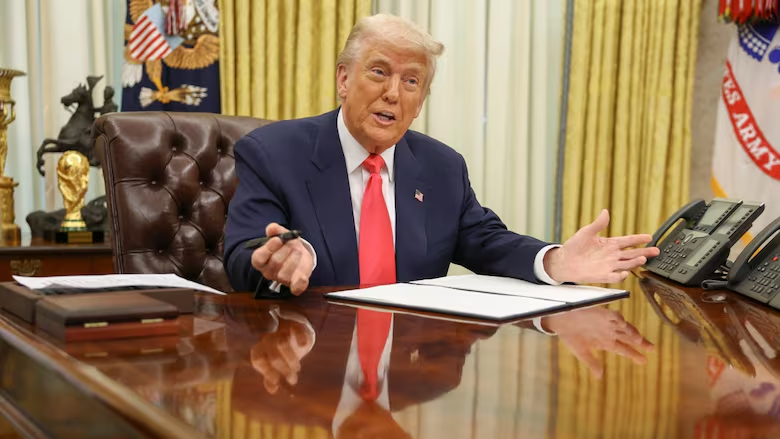The United States has solidified its stance on international trade, implementing expansive tariffs on steel and aluminum imports “with no exceptions or exemptions,” as promised by the White House. This move, while fulfilling a campaign pledge, has ignited a wave of global trade tensions and raised concerns about potential price increases for American consumers.
As these 25 percent duties take effect, the immediate impact is a projected rise in production costs for a wide array of goods, from household appliances to automobiles. “It wouldn’t surprise me to see the tariffs pretty quickly show up in prices,” stated Clark Packard, a research fellow at the Cato Institute, highlighting the potential for increased consumer expenses.
This is not just numbers; it affects everyday people’s budgets, their ability to purchase essential goods, and the overall cost of living.
The European Commission has swiftly responded, announcing “a series of countermeasures” effective April 1, citing “unjustified trade restrictions” from the United States. “We deeply regret this measure,” declared European Commission chief Ursula von der Leyen, emphasising the retaliatory nature of their response. This tit-for-tat dynamic underscores the escalating trade war, with potentially far-reaching economic consequences.
President Trump’s trade policies have been characterised by a series of aggressive moves against major U.S. trading partners, including Canada, Mexico, and China. The latest levies heavily impact Canada, a significant supplier of both steel and aluminium to the U.S., according to EY chief economist Gregory Daco. The broader implications extend to other key suppliers, such as Brazil, Mexico, the United Arab Emirates, and South Korea.
The layering of these new tariffs onto existing restrictions creates a complex landscape for international trade. For instance, some Canadian and Mexican steel and aluminium products could now face a 50 percent tariff rate, unless they comply with the US-Mexico-Canada Agreement (USMCA). This uncertainty has contributed to market volatility, with Wall Street indexes experiencing significant declines.
Read Also: US Tariffs Threaten Global Inflation, Nigeria at Risk, Warns CBN Governor
While President Trump downplays fears of an economic downturn, his administration acknowledges the “bumpy” nature of these trade negotiations. “It is a transition,” stated White House senior counsellor Peter Navarro, framing the volatility as a necessary part of the process. However, for manufacturers and consumers, this “transition” translates to real-world challenges.
The human angle here is significant. Manufacturers are scrambling to find cost-effective domestic suppliers, and the mere threat of protectionism has allowed U.S. steel and aluminium firms to raise prices. “It’s creating massive amounts of uncertainty,” Packard noted. While some U.S. manufacturers see these tariffs as a boon, others warn that they simply inflate import costs, making U.S.-made goods equally expensive.
Daco of EY further pointed out that these new levies are more comprehensive than those imposed in 2018, covering finished products in addition to raw materials. The higher aluminium import rate and the layering of duties are “likely to make foreign sourcing more expensive across multiple industries.”
Despite pressure from U.S. allies like Australia and Japan, who sought exclusions, the tariffs have been implemented without exemptions. Australian Prime Minister Anthony Albanese labelled the tariffs “entirely unjustified” but indicated his country would not retaliate. This highlights the varied responses from U.S. trading partners, each navigating the complex geopolitical landscape.
Looking ahead, President Trump has vowed to implement separate reciprocal levies as soon as April 2, targeting trade practices deemed unfair by Washington. This raises the prospect of further escalation and the potential for more products and trading partners to be drawn into the fray. As a news writer, I’ve seen that these economic decisions are not made in a vacuum, they have real world consequences for businesses, workers and everyday consumers.







